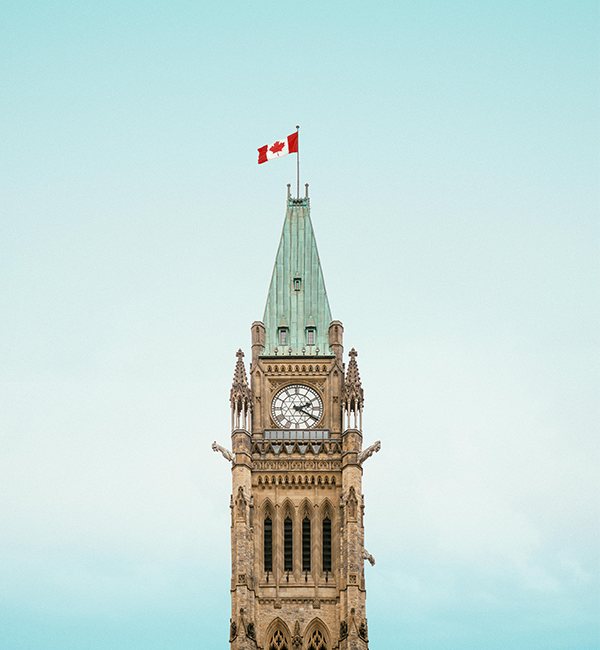Canada is a diverse and beautiful country boasting some of the most stunning and unique natural beauty. It is recognized as one of the most liveable countries in the world. Foreign visitors to Canada will need a visa or an Electronic Travel Authorisation (ETA) to enter the country. The official currency of Canada is the Canadian Dollar (CAD). Although the vast majority of Canadians speak English as a first language, around 20% of the population, most of who reside in the province of Quebec, are bilingual and speak both English and French. It is important to note, that some smaller towns outside the big metropolis cities or tourism areas in Quebec only speak French.
Given Canada’s immense size, most visitors and Canadians alike, choose to fly when travelling across the country. For those taking smaller trips or want to experience the natural splendour of Canada from the comfort of a train carriage or at their own pace, you have the option to rent a car or travel by train operated by VIA Rail. Train travel can be an enjoyable and affordable option, however for the longer haul experiences travel can spread over many days.
We will assist you through the process of getting employment contract and two years working permit visa that will make your Canada relocation dream comes to reality. Top Travel Recruitment successfully processes Canada visa in any of the section listed below;
- Student Visa
- Work Permit
- Spousal Sponsorship
- Providential Nominee Programme
- Tourism/Visitor

- Student Visa
If you are looking forward to studying in a Canadian institution as an international student, you are required to apply for a study permit. Study permits are issued by Immigration, Refugees, and Citizenship Canada (IRCC). International students cannot study in Canada without getting a valid study permit. This is why we are here to assist you through the entire process. We help you to apply and be accepted by a designated Learning Institution. For those who are willing to applying for Quebec, you would also need a CAQ which would be duly notified. Study permits authorize you to study at a designated learning institution (DLI) in Canada.

However, you do not require a study permit if the following conditions apply to your case;
- Your study program is for 6 months or less.
- You have minor children inside of Canada.
- You are accompanying a foreign representative as a family member or staff.
- You are a member of the armed forces of a country designated for the purposes of the Visiting Forces Act
- You are a registered Indians
Are you interested in getting Student visa to Canada? Apply here
- Work Permit/Canada Labour Market Impact Assessment (LMIA)
Canada offers you a vibrant economy if you are looking for better opportunities to grow your career. Canada boasts a safe and diverse working environment with strict labour laws and competitive wages. For you to be qualify working in Canada, You need a work permit from the government body of Immigration, Refugees, and Citizenship Canada (IRCC) before you come to Canada. Temporary work permits authorize foreign nationals to work in Canada for a period of time. Work permits are issued based on grounds ranging from employment needs in Canada, work experience, education, bilateral agreements, and pilot programs. Depending on authorization, work permits can allow for full or part-time employment. A work permit may also enable you to apply for permanent residency.
What are the Different Types of Work Permits?
You may apply for many types of work permits based on your situation such as;
1. Open Work Permit: An open work permit authorizes a foreign national to work in Canada for any employer and in any location. A restricted open work permit may restrict an industry or occupation but allows you to work across Canada. All open work permits are exempt from the Labour Market Impact Assessment (LMIA).
2. Post-Graduate Work Permit: Post-Graduate Work Permit (PGWP) is for international students who have graduated from a designated learning institution (DLI). Post-graduate work permits allow students to gain Canadian experience after completing their study program. This permit is valid for up to 3 years, and the duration is based on the length of your study program.
3. Work Permit Options for IT Workers: Work Permit Options for Information Technology (IT) workers in Canada have many specific work permit options.The Global Talent Stream (GTS) is for employers who wish to hire highly qualified and experienced professionals.
4. The Intra-Company Transfer Program: This allows an international business with a parent, subsidiary, branch or an affiliate of that enterprise in Canada to bring an executive, senior manager or an employee with specialized knowledge to Canada on a temporary work permit.
Do you want to get Work permit to Canada? Book here
5. Inland Spousal Sponsorship Open Work Permit: The Inland Spousal Sponsorship Open Work Permit is for the spouses of Canadian citizens or permanent residents. You must have a valid temporary residence permit and an application for permanent residency under process to be eligible to apply.
6. Bridging Open Work Permit: You may be eligible to apply for a Bridging Open Work Permit (BOWP) if you have already applied for permanent residency under the Federal Skilled Worker Program, Federal Skilled Trades Program, Canadian Experience Class Program, Provincial Nominee Program, Agri-Food Pilot, Home Child-Care Provider Pilot or the Home Support Worker Pilot Programs. It is an open work permit, which allows you to continue to work while your permanent residency application is in process.

What are the Exceptions to Requiring a Work Permit?
The exceptions to requiring a work permit include:
Work Without a Work Permit: There are certain occupations and circumstances that allow a foreign national to work without a work permit in Canada. However, you will still be required to meet additional eligibility requirements.
Short-Term Work Permit Exemption: The Short-term work permit exemption for Canada is a program that facilitates the hiring of highly skilled professionals for a limited period of time.
If your occupation is listed in skill type 0 (management occupations) or skill level A in the matrix of the NOC, you can be granted a permit for 15-30 consecutive days or a 120-day work permit if you are a researcher.
There is current recruitment for jobs in Canada in the following areas; Computer analyst & Hotel jobs, Engineering, Nursing, Fish parking, branding, Chefs cook, Welders, Nannies, Drivers, Administrative post, Construction workers for Construction Industries, Carpenters, Shuttering, Building electrician, Industrial electrician, welders mason, Tile fitter Plasterer painter, Plumbers, Scaffolders.
Express Entry
Canada Express Entry (EE) system is a selection process used by the Canadian government department of Immigration, Refugees and Citizenship Canada (IRCC) to select skilled immigrants to become permanent residents of Canada. In order to enter the pool, eligible candidates must meet the Express Entry Canada requirements by qualifying for one of the following Canadian immigration programs.
Express Entry encompasses three Canadian immigration programs:
Federal Skilled Worker Program,
Federal Skilled Trades Program,
You have 90 days to complete the online profile and upload the required documents.
Your profile contains your personal information and skills that contribute to your score in the point-based Comprehensive Ranking System (CRS).
The profile will help the IRCC determine if you meet Canada Express Entry requirements.
If you are eligible, you will then be accepted into a pool where you will be ranked according to your CRS score. You will then wait in the pool until you receive an Invitation to Apply (ITA) for permanent residency.
Express Entry Points
The CRS gives you a score based on the information in your profile, including;
1. Skills
2. Education,
3. Language ability
4. Work experience
and other factors
You can increase your points for Express Entry with,
– Canadian degrees diplomas or certificates,
– A valid job offer
– A nomination from a province or territory
- Spousal Sponsorship

Canada understands the value of familial relationships and wants to keep and bring families together. The Family Class Immigration category allows for different types of spousal sponsorships.
The Canadian spousal sponsorship allows you to sponsor your spouse, conjugal partner, or common-law partner for permanent residency in Canada.
Both you and your spouse must be approved by the government body of Immigration, Refugees, and Citizenship Canada (IRCC).
Who is Eligible for Spousal Sponsorship?
You must meet the following requirements to be eligible to sponsor your spouse:
Be of 18 years or older, Be a Canadian citizen, a permanent resident, or a registered Indian under the Canadian Indian Act, Reside in Canada or intend to live in Canada after your spouse is granted permanent residency, Financially support your spouse for 3 years.
What Kind of Supporting Documentation is Required for Spousal Sponsorship?
If you are sponsoring your spouse, then the following proof of your relationship will be required;
1. Completed relationship information and sponsorship evaluation questionnaire.
2. Marriage certificate.
3. Wedding Invitation and photos.
4. Birth certificates or adoption papers for any children you might have.
5. Proof of marriage registration with a government authority.
What are Alternative Definitions of Spousal Relationships?
Common-Law Partnership: A common-law partnership is a couple that has been living together for 12 consecutive months and is not legally married. Any time spent away from each other was because of valid obligations and was short and temporary. Same-sex relationships are also included in this definition.
Conjugal Partnership: A conjugal partner is someone who has had a close relationship with you for 1 year but you were not able to live together or get married typically due to immigration or other legal barriers. They will be eligible for spousal sponsorship. You can not apply as conjugal partners if you are both residing in Canada. This definition is valid for both opposite and same-sex relationships. Get Spousal sponsorship visa here
- Providential Nominee Program
Canada is a beautiful and welcoming country with rich cultural and social diversity. Every province and territory in Canada has its own unique characteristics and many are abundant with natural resources. The country has a stable political and banking system recognized globally. Economic opportunities are widely available.
There are a total of 10 Canadian provinces from the west to east: British Columbia, Alberta, Saskatchewan, Manitoba, Ontario, Quebec, New Brunswick, Nova Scotia, Newfoundland and Labrador and Prince Edward Island.
There are 3 territories to the north and from west to east that include: the Yukon Territory, the Northwest Territories, and Nunavut.
Most provinces and territories in Canada offer their own Provincial Nominee Program (PNP) for foreign nationals who want to live and work in a specific province or territory.
There are different benefits to moving to different provinces. For example, British Columbia is the westernmost province of Canada with scenic coastlines and the most temperate weather in Canada.

Alberta is famous for its crude oil industry, the Calgary Stampede, and the Rocky Mountains range.
Within Manitoba, the town of Churchill is ranked among the 3 best places in the world to observe the Northern Lights known as the Aurora Borealis.
Except for the territory of Nunavut and the province of Quebec, each province has its own PNP with a signed agreement alongside the federal government body of Immigration, Refugees and Citizenship Canada (IRCC).
The PNPs allow provinces to nominate their own candidates for provincial nomination based on their potential to meet the labour market needs of their respective regions, populace and economies.
The PNPs each operate as multiple immigration pathways for foreign skilled workers who wish to apply for permanent residency in a chosen province or territory with all the pathways contributing to the benefit of the entire country
- Tourism/Visitor
Do you want to visit Canada? Travel to beautiful places, visit tourist sites, family members and friends? A visitor visa allows foreign nationals like yourself to enter Canada as a visitor. Whether you are an international student looking to study, a temporary worker looking to work, or visiting for tourism, you are required to apply for a visitor visa for your temporary stay in Canada.
What are the Different Types of Visitor Visas?
There are two different types of visitor visas, described below;
A Temporary Resident Visa (TRV) authorizes you to enter Canada as a temporary resident. If you are from a visa-exempt country, then you don’t need to apply for a TRV. The TRV is also referred to as a Visitor Visa.
A single entry visa allows you to travel to Canada once during the validity period.
A multiple-entry visa can be issued for a maximum period of 10 years or 1 month before the expiry date on your passport, whichever is earlier. The multiple-entry visa allows you to re-enter Canada as many times as you want during the validity period.
The maximum period of stay allowed for a visitor is 6 months from the date of arrival. Visa processing for tourism has been so easy with Top Travel Recruitment. Apply now

